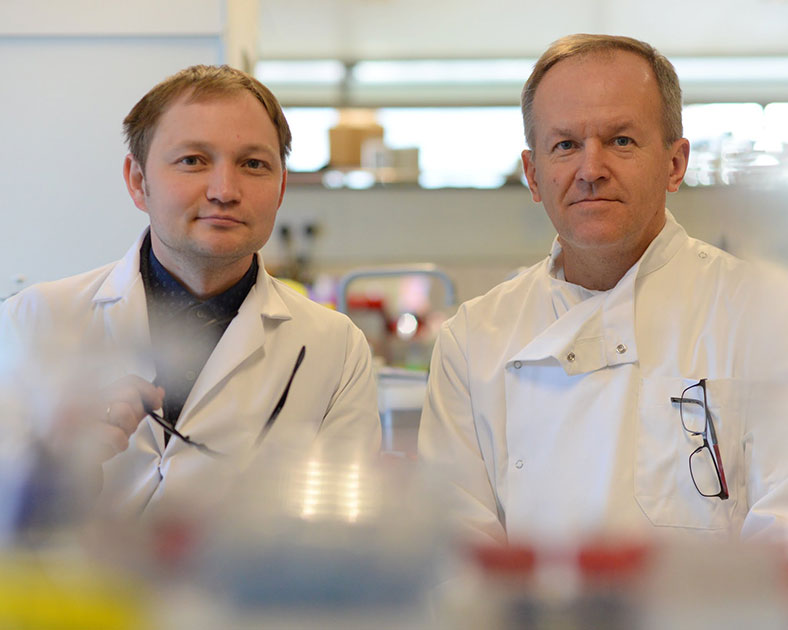Small solutions for large healthcare problems: School of Biochemistry and Cell Biology researchers are at the forefront of nano-biosensor research

Some materials, when they get a billion times smaller than size of a human body, acquire principally new and often unexpected features. Miniscule but powerful nanoparticles (from Greek word “nanos” meaning “dwarf”) drive the modern technical progress and shape the way we live. Computers and smartphones, medical scanners and spacecrafts, CCTV cameras, telescopes and the cosmetics are just a few examples of devices that exist thanks to the advanced nanomaterials.
In biomedical science, nanoparticle biological sensors (or simply nano-biosensors) open new horizons for diagnostics, therapy and basic research, affecting modern and future healthcare. In particular, nano-biosensors based on organic polymers can either deliver specific drugs to the unhealthy tissue target or inform about the tissue and cell health status. The key research challenge here is to understand how nanomaterials interact with biomolecules within tissues, and to learn how to precisely deliver nanoparticles to the exact address in human body.
The research team led by Dr R. Dmitriev (Science Foundation Ireland-funded Starting Investigator) in collaboration with Dr A. Zhdanov, Dr I. Okkelman and Professor D. Papkovsky from Biophysics and Bioanalysis Lab, School of Biochemistry and Cell Biology, UCC in joint efforts with Graz University of Technology (Austria), University of Maryland (USA) and Empa (Switzerland) have a long-standing interest in the design and application of new generation nano-biosensors for quantitative live cell and tissue imaging.
In the article published in the prestigious Advanced Functional Materials journal (IF=12.12), the team described principally a new type of nano-biosensor, sensitive to the changing concentrations of potassium ion. Potassium is among the most abundant elements of our body, essential for brain, gut, muscle and kidney function. Abnormalities in potassium turnover may cause development of notorious diseases such as cancer and ischaemia, therefore accurate measurement of this ion is crucial for biomedicine.
The new nano-biosensor brightly stains the broad range of mammalian cells, including ‘difficult-to-grow’ cells isolated from the brain. For the first time, UCC researchers and their collaborators have shown efficient staining with potassium-selective nanoparticles of three-dimensional tissue models, such as spheroids made of tumour and stem cell, organoids and brain sections. After thorough studying of the mechanism involved in the uptake of nano-biosensors by cells, Dr Dmitriev and colleagues applied them for imaging of potassium-induced changes in polarisation of neurons and for analysis of epileptic seizures in the brain. Development of these nanoparticles may have far reaching implications in many fields including physiology and biomedicine, but also can serve as a strong platform for advanced design of future polymer-based nanoparticle biosensors.
The full-text of article can be assessed here: http://onlinelibrary.wiley.com/doi/10.1002/adfm.201704598/full
More on the research activities of this team can be found here: http://photobiolabcork.blogspot.ie/
